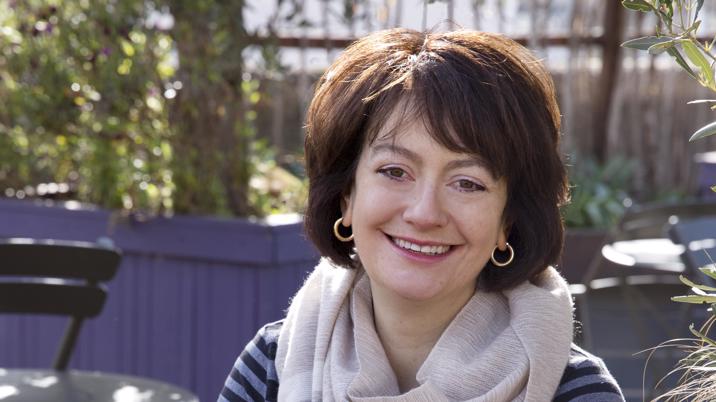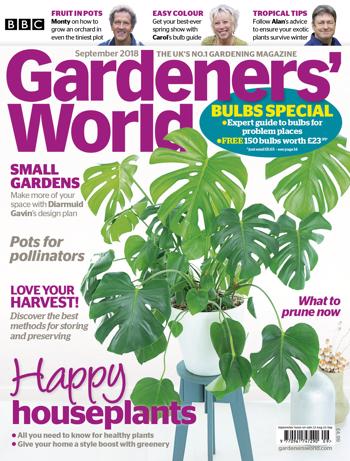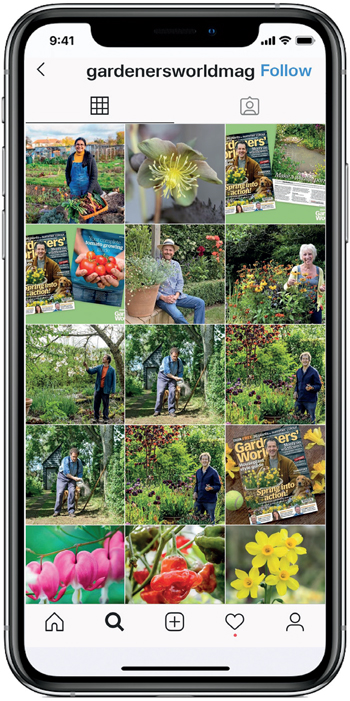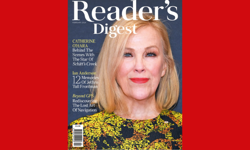
A year shy of its 30th anniversary, BBC Gardeners’ World magazine continues to grow from strength to strength at a time when falling circulation and ad revenues are squeezing many. Don’t assume its success depends on the profile ensured by the eponymous long-running TV show, however, says its editor Lucy Hall. Relevance is what’s key to success.
BBC Gardeners’ World is one of Britain’s biggest gardening brands – in part, thanks to the 2.5-3m people each week who watch the BBC 2 TV series, which was been running since 1968. But TV spin-off is only part of its story.
BBC Gardeners’ World magazine began life in 1991 and was published by the BBC until 2011, when it was sold to Immediate Media Company. Today, the magazine is the country’s biggest-selling gardening title – with a combined ABC of 170,295, up 0.1% year-on-year. And gardenersworld.com claims to be the country’s leading gardening website – over the same period, its reach reportedly rose 20%. Then there is the four-day consumer show BBC Gardeners’ World Live. Launched in 1992, it returns this June. Last year, just over 100,000 people visited, which in part explains Immediate’s decision in 2019 to take a majority stake in its organiser, River Street Events, with a view to taking over full control later this year.
Back to the magazine, and one third of BBC Gardeners’ World magazine sales are via the newsstand; two thirds via subscription – making it the UK’s third largest monthly subscription title. All subscribers can register to access Secret Garden – a members’ club-style subscriber-only area of the otherwise free to visit gardenersworld.com site, launched in 2016. To date, one third of all subscribers – around 40,000 – have chosen to do so to access exclusive, added value offers and content.
One of the roots of its success has been its ability to respond to and keep pace with the world of gardening.
Staying relevant
“Our objective is simple,” says Hall, who took over as BBC Gardeners’ World magazine editor in 2012 having been deputy editor for just shy of the ten preceding years. “Wherever gardeners are, we are here for them. Our mission is delivering information, reassurance and inspiration but, above all, it’s about being relevant.”
In this lies the key to BBC Gardeners’ World magazine’s publishing strategy. For one of the roots of its success has been its ability to respond to and keep pace with the world of gardening.
Gardening is a large marketplace with significant room for further growth, which has already changed considerably from when gardening was, for many, mostly a hobby mainly enjoyed by older people, Hall points out. There are currently an estimated 23m gardens and 15m active gardeners in the UK, a significant proportion of whom the brand is yet to reach.
Dig beneath the surface and it’s evident that gardeners have grown – and are continuing to grow – more diverse.
So today’s marketplace – and BBC Gardeners’ World magazine’s target ranges from older gardeners with expertise (its core readership) to newer, younger gardeners with less (a fast-growing audience); from thirtysomethings with young children (many of the latter having been introduced to gardening by recent National Curriculum changes) to city dwellers with limited or no space, only a window box or just a pot plant (something Hall refers to as a “gateway product”).
“Gardening has become a family bond, crossing the generations in a way food began to ten years ago. Even so, we are finding more younger people coming to us because they don’t know how to garden,” she says.
Evidence from visitor behaviour on the gardenersworld.com website and print reader research points to a passion among younger people for connecting with nature – even if they can’t afford the money, time or space to have their own garden. Which is one reason behind a recent decision to put a house plant on the magazine’s cover – a move that resulted in newsstand sales spiking by 22%.
“We consciously fight the perception that gardening is just for people with houses and bigger gardens,” Hall continues. “We champion small-scale answers and solutions and always have.”
Dig deeper, and it’s also clear that many of the forces that have driven this shift are set to continue influencing the marketplace for quite some time.
Growing interest in the physical benefits of gardening and outside spaces, for example, shows little sign of reversing. And the same can be said of rising awareness of the positive impact gardening can have on mental health and as an antidote to a life lived on screens. Then there’s the recent exponential growth in interest in how to be more sustainable to help combat climate change.
Gardening has become a family bond, crossing the generations in a way food began to ten years ago.

Reader insight
Looking back, the magazine’s sale to Immediate – a company with a reputation for investing in brands and unlocking their potential – was a watershed moment for a title that, at the time, Hall says, was “a sleeping lion waiting to leap”. Investment in research and analytics combined with centralised knowledge pooled from other Immediate titles enabled the team to better identify how and where to add value to readers’ overall experience – not just in print.
The audience was segmented and closer attention paid to keeping on top of different segments’ evolving behaviours, wants and needs through more research – building on the readers survey conducted annually for the past ten years with online surveys, social media, focus group and anecdotal feedback at live events. This enabled BBC Gardeners’ World magazine’s core proposition and all its products – from themed standalone guides, supplements and one-shots to merchandise, talks, trips and tailored itineraries – to become more responsive and evolve accordingly.
Content, subscriptions and promotions strategies were aligned more closely to the cyclical nature of the gardening year, with January to June – when most gardeners are most active doing most work – the focus for the bulk of activity. And a further shift in emphasis occurred in the printed product with a move away from functional to featuring more inspirational content. An updated design and format which goes live this May will further underline this.
Meanwhile, more immediate timely and practical content needs are increasingly served online where Google Search is now a massive driver of readers. Last year, a dedicated SEO team was set up in-house to capitalise on this. And this helped achieve 1m+ unique visitors and gardenersworld.com enjoying in January a 56% spike in website traffic year-on-year.
With a significant volume of BBC Gardeners’ World magazine content ‘evergreen’ – so still relevant year after year – the trick is to keep revisiting it to stay smart about the terms used to describe it online, Hall explains, while continuing to add more and more new content. Video – to date, 1,000+ clips are available – is a growing priority. As is BBC Gardeners’ World’s presence on Instagram where it has built 230,000 followers in the past two years from a standing start.
We consciously fight the perception that gardening is just for people with houses and bigger gardens.

Climate friendly
As critical as the upscaling of audience insight and understanding, however, has been Immediate’s willingness to embrace sustainability. For gardening is at the front line of climate change, which is why climate change is now re-shaping both content and business strategy.
“Almost the day after Blue Planet was broadcast, we were contacted on social media and via email by readers saying, my issue just arrived in plastic – what are you going to do?” Hall recalls. “We felt from the outset, the worst thing to do would be to have a knee-jerk reaction and leap to the wrong conclusion. And we said to ourselves, we’ve got to find a solution to this quickly. So, it was painful that it took another nine or ten months, as print production is a slow machine to move.”
The upshot was that BBC Gardeners’ World magazine has used FSC-certified paper wrap for mailing all copies since its October 2019 issue.
“At the outset, we assumed potato starch packing would be the perfect solution. But early on, we employed a fantastic consultant who looked at the whole carbon footprint and it was clear plastics is just one part of the whole issue,” Hall adds. “You can’t ignore the CO2 impact of potato starch, which is phenomenal.” Or the fact that without a compost heap or recycling service willing to accommodate it, you end up simply passing the problem back, she adds.
The next task is finding a robust enough paper solution for the newsstand, and trials are on-going. Meanwhile, as a business, there is a strong internal focus on tackling Immediate’s own carbon footprint. “Sustainability is a core strategy for us now – in fact, everything we do we reference against it,” Hall continues. “Recently, we introduced a thriving new channel in print and online with a dedicated test editor, and everything tested for quality and value is also assessed through a sustainability lens.”
Looking ahead, the future of BBC Gardeners’ World magazine – like the future of gardening – will be hugely influenced by climate change, she predicts. Meanwhile, focus will be on maintaining and growing the title and its related products.
Growing subscriptions is an obvious priority. But so too is growing the proportion of subscribers registered to access Secret Garden content, deepening the pool of super-committed readers – an audience highly motivated to buy related products and service in exchange for increasingly more relevant content.
Personalisation is a significant opportunity, Hall believes. This will be enabled by Fabric – the technology platform launched by Immediate in 2017, to which all of its 30 or so brand websites are migrating and across which any new functionality for one brand can be shared. Important personalisation lessons will be learned through insight-sharing across titles already actively exploring this area, such as Radio Times, she predicts.
“The BBC has long term plans for Gardeners World on TV, which is obviously good news for us,” Hall observes. “But though we have high awareness, we must work hard to stay relevant to the widest number of people we can reach.”
That’s the challenge. But it’s also a significant opportunity.
This article was first published in InPublishing magazine. If you would like to be added to the free mailing list, please register here.












